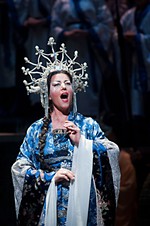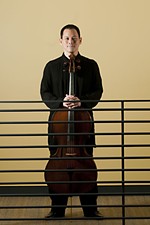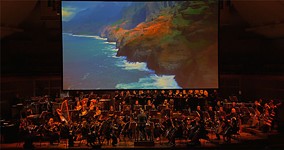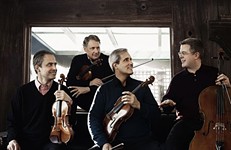Una Panthera: Music from the Trecento and Early Renaissance Italy
Local Arts Reviews
Reviewed by Robi Polgar, Fri., Feb. 15, 2002
Una Panthera: Music from the Trecento and Early Renaissance Italy: Exquisite longing, Exquisite life
First English Lutheran Church,
February 9 When you were in love in the late 14th century, often the object of your passion was unobtainable, so you did then what people do now when they need to express their deliciously tumultuous emotions: You penned a love song. The other love, obtainable, but wrought with personal challenges and sacrifices, had to do with being a good Christian, and there are plenty of examples of songs from the period built on this theme. As part of its six-week Mid-Winter Festival of Music (which continues through March 3), the Texas Early Music Project (T.E.M.P.) presented a collection of songs of both sorts, hailing from the increasingly complex "Ars Nova" style of songwriting prevalent in early Renaissance Europe. Exquisite pain and longing were brought to exquisite life in the enrapturing voices and instruments of T.E.M.P. singers and musicians in this concert of music you'd have heard (or sung) had you lived in the north of Italy at the time.
The range of performances included songs sung by a single voice, duets, and complicated, overlapped four- and five-voice pieces. The singers were accompanied by a five-piece chamber group that played in just as many configurations: all together, solo, and any combination in between. Throw in a few instrumentals and a bit of enlightenment as to the history of the various instruments, and the entire night's work was as interesting -- and satisfying -- as one could wish.
The evening's highlight came early, with Judith Overcash and Jenifer Thyssen singing a haunting, gorgeous piece by Francesco Landini, lamenting the pursuit of vain hopes, Per seguir la sperança. Clear and strong, the two sopranos' voices intertwined beautifully, complementing each other sometimes as dueling echoes, sometimes as one, throughout the desperate love song.
In another beautifully sung piece, tenor Daniel Johnson turned thoughts heavenward with the dazzling and sweet Io son un pellegrin (I am a pilgrim), by Lorenzo da Firenze, sung to solo harp played by guest artist Therese Honey.
Tenors Christopher LeCluyse and Johnson combined for a spirited hunter's song, ever so slightly comic in its boisterousness: Tosto che l'alba, penned by another Florentine, Gherardello.
Local early musicians Jan Jackson (recorders), John Walters (vielle and rebec), and Scott Horton (lute) were joined by Honey and by Tom Zajac of early music group Piffaro, who played a variety of blown instruments, many of which were re-conceived by modern artisans from textual or pictorial sources; bagpipes (yes, you can find a quiet bagpipe), douçaine, recorder, pipe, and an idealized (and slightly anachronistic) 15th-century trombone all made appearances. Up-tempo dance pieces known as Saltarellos ("jump-dances") provided an improv-like opportunity for the quintet to explore complicated rhythms and melody lines.
The evening's finale was a third sort of love song. Sung to one's patron -- the man (or woman) whose money allowed composers and troubadors to pursue their art -- this sort of love song was full of the loftiest praise imaginable ("O Francesca Zarabella, glory, teacher, honor, light of Padua"). Mezzo Stephanie Prewitt, a T.E.M.P. regular, joined the other singers for this Johannes Ciconia piece that was as exuberant musically as the praises contained within -- a fitting end to a stellar evening of ancient and immediate song.










